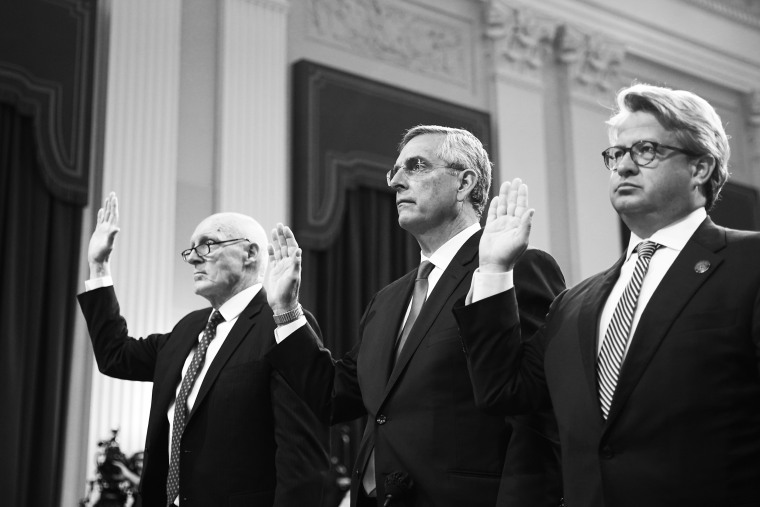The House Jan. 6 committee continued to hammer its main theme on Tuesday: Lacking a credible reason to overturn the election, Donald Trump and his allies sought to shame, bully and coerce state officials into manufacturing the victory the voters had denied him.
But in its latest hearing, the committee offered a new perspective. In his zeal to retain power, Trump and his allies trampled largely defenseless people who had the misfortune of getting in their way.
If not for the backbone they showed, Trump might have succeeded in subverting the nation’s democratic traditions.
Defying Trump came at great personal cost. In emotional testimony, witnesses described the anguish they suffered from a Trump pressure campaign that has left them shaken to this day. Convinced that the election was stolen, Trump supporters demonized and threatened election officials and low-level workers who had merely tallied and reported accurate results.
Here are the top takeaways from Tuesday’s hearing:
Trump and company steamrolled innocent people to get a second term
One of the falsehoods peddled after the election was that election workers in Georgia had plucked fraudulent ballots from “suitcases,” giving Joe Biden the votes to win the state. The story was thoroughly debunked. Multiple recounts showed that Biden indeed won the state, while the “suitcases” were actually carriers that are routinely used in storing ballots.
The committee aired a clip of Rudy Giuliani, a former adviser to Trump, appearing before a Georgia legislative committee and alleging that a mother-daughter pair of election workers, Ruby Freeman and Shaye Moss, had “surreptitiously” passed around USB devices “as if they’re vials of heroin or cocaine.”
Trump mentioned them in the famous phone call in which he asked Georgia Secretary of State Brad Raffensperger to “find” the votes needed to defeat Biden. He called the mother, Freeman, a “professional vote scammer” and a “hustler.”
In testimony, Moss described how people came into her grandmother’s house looking to find her and her mother and trying to make a “citizen's arrest.”
“I felt so helpless and horrible for her,” Moss recalled. “She was screaming. I told her to close the door and don’t open the door for anyone.”
The workers had done nothing wrong, as subsequent investigations showed. The USB device that Giuliani mentioned? Moss said her mother was handing her “a ginger mint.”
After the hearing, committee members left the dais and one by one lined up to thank and hug Moss and Freeman.
Giuliani appears again and again in the drive to overturn the results
The former New York City mayor played an outsize role in trying to keep Trump in office, as the hearings have revealed. Giuliani pressed Arizona House Speaker Rusty Bowers to convene a meeting of the state legislature to consider allegations of election fraud. Bowers was reluctant to do it, not wanting to be “a pawn” in the fight over the election, he testified. He repeatedly asked Giuliani and Trump for evidence that the election was stolen — of names of people who had voted illegally.
He described a meeting with Giuliani and one of his associates, Jenna Ellis, in which he asked them for proof of wrongdoing. Neither provided any. Giuliani, he said, told him: “We have lots of theories. We just don’t have the evidence.”
The committee has the goods
One question before the hearings began was whether all the press leaks surrounding Jan. 6 would undercut the committee’s work. The committee faced a risk that viewers might tune out, feeling they’ve heard it all before. But the committee continues to present fresh testimony that deepens the public’s understanding of the attack on the Capitol.
At times, the new disclosures are small, but telling. In Tuesday’s hearing, the committee played snippets of Giuliani’s voicemail messages to state lawmakers asking them to return his calls and discuss the election. One official, Pennsylvania House Speaker Bryan Cutler, tried to get Giuliani to stop phoning. “I understand you don’t want to talk to me now, but I just want to bring some facts to your attention,” Giuliani said in one recording.
Mark Meadows, Trump’s fourth and final chief of staff, wanted to send memorabilia to Georgia state employees in an office that was auditing the election results, committee member Adam Schiff, D-Calif., disclosed at the hearing. Text messages showed that Meadows had wanted to send investigators in the office items that included autographed MAGA hats. White House staff prevented that from taking place.
Committee ups pressure on Trump former counsel Cipollone
The Jan. 6 panel has heaped praise on those Republicans who stood up to Trump and have testified publicly. Panel members now seem to be trying to lure Trump’s former White House counsel Pat Cipollone to join them at a hearing.
As she closed Tuesday’s session, Rep. Liz Cheney, R-Wyo., called on Cipollone to reverse course and share his story before the committee.
“Our evidence shows that Pat Cipollone and his office tried to do what was right. They tried to stop a number of President Trump’s plans for Jan. 6,” Cheney said. “We think the American people deserve to hear from Mr. Cipollone personally. He should appear before this committee, and we are working to secure his testimony.”
Cipollone and his deputy, Patrick Philbin, informally met with the committee in April. The panel wants Cipollone to testify publicly because he reportedly objected to Trump’s plan to fire acting Attorney General Jeffrey Rosen and replace him with Jeffrey Clark, who supported the president’s bid for the Justice Department to pursue false claims of widespread voter fraud.
But it’s unclear if Cheney’s challenge will have any effect: A person close to Cipollone said, “Pat has been cooperative with the committee with President Trump’s permission, but there are serious institutional concerns and privilege issues and those have been recognized by the committee.”

